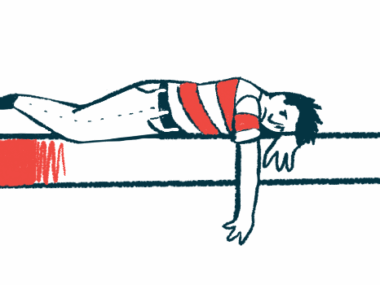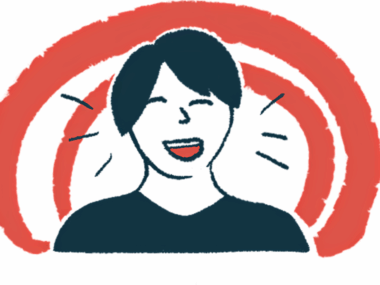Psilocybin eases depression, anxiety in Parkinson’s: Pilot trial
Psychedelic compound also may have cognitive, motor benefits
Written by |

Low-dose psilocybin, a naturally occurring psychedelic compound, may be a promising therapy for mood issues including depression and anxiety in people with Parkinson’s disease, according to data from a pilot Phase 2 clinical trial.
In addition to significant reductions in depression and anxiety, results from the trial (NCT04932434) pointed to psilocybin’s potential benefits for patients’ cognitive and motor function.
The study was conducted by researchers at University of California San Francisco’s Translational Psychedelic Research (TrPR) program and funded by an anonymous donor.
“We are still in very early stages of this work, but this first study went well beyond what we expected,” Ellen Bradley, MD, the study’s first author and associate director of the TrPR program, said in a university news story.
The trial’s results were described in the study, “Psilocybin therapy for mood dysfunction in Parkinson’s disease: an open-label pilot trial,” which was published in Neuropsychopharmacology.
Evaluating psilocybin in neurodegenerative diseases
Besides Parkinson’s hallmark motor symptoms, people with the neurodegenerative disease may experience emotional and mood issues, like depression and anxiety, that often precede the onset of motor symptoms.
“Many people don’t realize this, but mood symptoms in Parkinson’s are linked to a faster physical decline,” said Bradley, an assistant professor at UCSF. “And they are actually a stronger predictor of patients’ quality of life with Parkinson’s than their motor symptoms.”
Psilocybin is a psychoactive substance produced by certain species of fungi that alters perception, mood, and several cognitive processes. A number of trials are evaluating the potential benefits of psilocybin in people with Parkinson’s.
“This study provides the first data on psilocybin’s effects in any neurodegenerative disease,” the researchers wrote. “Results suggest that psilocybin therapy in PD [Parkinson’s disease] warrants further investigation.”
The researchers evaluated the safety and preliminary efficacy of psilocybin therapy in 12 adults (seven men and five women) with mild to moderate Parkinson’s who also had depression and/or anxiety.
Patients’ mean age was 63.2, and they had been living with a Parkinson’s diagnosis for a mean of 4.5 years.
Each participant received one, 10 mg dose of psilocybin, followed by a 25 mg dose two weeks later, together with psychotherapy sessions. Each psilocybin session involved the ingestion of a psilocybin capsule in a quiet room and in the presence of the patient’s therapist, who monitored for safety and provided psychological support.
Participants were evaluated for changes in mood, cognitive function, and motor function one week after each dose, and one month and three months after the last dose.
Ten participants experienced adverse events while on psilocybin. The most common were anxiety, nausea, headaches, and elevated blood pressure, and none required medical intervention. There were no reports of serious adverse events.
Patients experienced significant decreases in Parkinson’s motor and nonmotor symptoms at the one-week and one-month follow-up evaluations, as assessed with the Movement Disorder Society-Unified Parkinson’s Disease Rating Scale (MDS-UPDRS).
One month after the last dose, scores on the scale’s Part I, which assesses Parkinson’s nonmotor symptoms, had decreased by 13.8 points. Scores on Parts II and III, which evaluate motor symptoms and their impact on daily life, decreased by 7.5 points and 4.6 points, respectively.
Improvements noted
“Psychotic symptoms were minimal at baseline [study’s start] and were significantly reduced post-treatment,” the researchers wrote, adding that there was also a significant improvement in patients’ cognitive function, particularly related to memory and learning.
Depression, assessed with the Montgomery-Asberg Depression Rating Scale (MADRS), was significantly reduced at both the one-week and one-month follow-up evaluations.
Anxiety, evaluated with the Hamilton Anxiety Rating Scale (HAM-A), was also significantly eased at the one-week follow-up evaluation, but changes after one month failed to reach statistical significance.
Three months after the last dose, the MADRS score had decreased by 9.3 points, and the HAM-A scores had dropped by 3.8 points — changes that were statistically significant.
Changes in MADRS scores were also considered clinically meaningful at all time points.
“While there is no agreed upon threshold for the HAM-A, a prior study of anxiety in PD estimated an [minimal clinically important difference] of 4 points,” the researchers wrote, meaning that only the changes at the one-week evaluation may have been clinically meaningful.
The researchers said the beneficial effect of psilocybin on the patients’ moods could have resulted in better cognitive and motor functions. Another possible explanation is that the drug could reduce inflammation and promote the growth and reconnection of brain cells, a process known as brain plasticity.
“The vast majority of brain diseases still lack interventions that change the course of illness,” said senior author Joshua Woolley, MD, PhD, an associate professor at UCSF and director of the TrPR program. “Now, that’s beginning to change. These results raise the exciting possibility that psilocybin may help the brain repair itself.”
The team is now conducting a larger Phase 2 trial (NCT06455293) to test psilocybin therapy in Parkinson’s patients with depression.
With the inclusion of a second site at Yale University, the study expects to enroll about 100 participants. In addition to changes in symptoms and mood, including depression and anxiety, the researchers will also analyze changes in inflammation and neuroplasticity.
This trial will be funded by the same anonymous donor and The Michael J. Fox Foundation for Parkinson’s Research.




